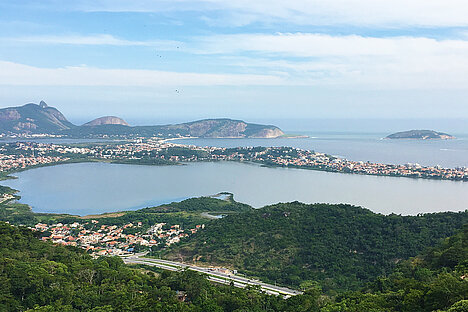- DE |
- EN
Connective Cities virtual workshop: Project planning of municipal adaptation measures in Latin American cities
Overview
In view of the current situation worldwide, attendance formats for international meetings are neither sensible nor formally possible. Nevertheless, the international community of practice for sustainable urban development Connective Cities continued its offer in Latin America and invited municipal practitioners from Latin America and Germany to participate in the follow-up (LINK NITEROI) virtual workshop on the topic of "Climate-proof and resilient urban development - project planning of municipal adaptation measures".
This time, 29 participants from eight different countries (Brazil, Ecuador, Argentina, Colombia, Mexico, Germany, Spain, USA) came together virtually to exchange experiences and knowledge. The aim of the event was to further develop the project ideas by revising strategic approaches with peer support and reflecting on examples from municipal practice.
Following project ideas were presented and jointly further developed:
- Project: Improving the resilience of people and environmental communities in areas vulnerable to climate change / Municipality: Portoviejo, Ecuador
- Project: Strengthening the ecosystem-based adaptation measures at the tourist location San Miguel de Allende / Municipality: San Miguel de Allende, México
- Project: Adaptation of existing and new households to the forecast increase in temperatures and precipitation for the Risaralda administrative area / Municipality: Quinchía, Colombia
- Project: Colina Verde - Strengthening of security conditions by limiting the risk of landslides and fires in the community of Boa Vista / Municipality: Niterói, Brazil
- Project: The importance of agroforestry systems as an adaptation measure to climate change and as an economic sector for the community of Tomé-Açu / Municipality: Tomé-Açu, Brazil

Program
The virtual planning workshop started with an introductory event on 15th of June 2020 and included four additional web-seminars on Tuesdays and Thursdays between the 16th and 26th of June 2020 - each seminar lasted about 2 to 2.5 hours and included plenary sessions as well as group work.
The program included a short overview of each participating project idea as well as the presentation of five thematically relevant practical examples including a discussion round to create a knowledge transfer. In addition to the peer-to-peer consultation, elements and tools of the Design Thinking method were presented and applied in group work. These tools were then used by the project representatives to further develop the project ideas outside the online session.
Programme (in Englisch, pdf, 199kb)
Keynotes
Good Practices
Anchoring of climate change mitigation and adaptation measures in the land use planning procedure, Landshut, Bavaria, Germany
Stella Haun, Climate Change Manager for the City of Landshut (2017- 2019)
Planes de gestión de riesgos climáticos en Muisne (Ecuador) con enfoque de género
Patricia Velasco
Planificación participativa para la resiliencia al clima en Santo Tomé, Santa Fé, Argentina
Jorgelina Hardoy
Programa silas "Servicios Inteligentes de Agua y Saneamiento"
Dr. Arq. Mario Alejandro Nudelman
EcoSmart City
Ericka Toledo Zurita
Presentations
Projekte / Projektideen
Stärkung der Resilienz von Menschen und Umweltgemeinschaften in vom Klimawandel bedrohten Gebieten / Stadt: Portoviejo, Ecuador
Mejorar la resiliencia de las comunidades antrópicas y ecológicas en zonas de riesgo frente al cambio climático / Ciudad de Portoviejo, Ecuador
Eriko Joseph Bernal Chancay, Johnny Marcelo García Arias
Stärkung der ökosystembasierten Anpassungsmaßnahmen am Tourismusstandort San Miguel de Allende / Gemeinde: San Miguel de Allende, México
Aumentar las medidas de adaptación basadas en ecosistemas, en el sitio turístico de San Miguel de Allende / Comunidad: San Miguel de Allende, México
Anpassung von bestehenden und neuen Wohnanlagen an den prognostizierten Anstieg der Temperaturen und Niederschläge für das Verwaltungsgebiet Risaralda / Gemeinde: Quinchía, Kolumbien
Adaptación de los hogares existentes y nuevos al aumento previsto de las temperaturas y las precipitaciones en la zona administrativa de Risaralda / Municipio: Quinchía, Colombia
Katherine Arcila Burgos, Tito Morales, Carlos Hernán Toro Acuña, Nancy Guerra Rojas
Colina Verde - Stärkung der Sicherheitsbedingungen durch Risikobegrenzung von Erdrutschen und Bränden in der Gemeinde Boa Vista / Gemeinde: Niterói, Brasilien
Colina Verde - Fortalecer las condiciones de seguridad limitando los riesgos de deslizamiento y quema en la región "Boa Vista" / Municipio: Niterói, Brasil
Walace Medeiros, Valéria Braga, Victor Ramos Costa
Die Bedeutung von Agroforstsystemen als Maßnahme zur Anpassung an den Klimawandel und als Wirtschaftszweig für die Kommune Tomé-Açu / Gemeinde: Tomé-Acu, Brasilien
La importancia de los sistemas agroforestales como medida de adaptación al cambio climático y como sector económico para la comunidad de Tomé-Açu / Comunidad: Tomé-Acu, Brasil
Ernesto Katsunori Suzuki, Osvaldo Moraes de Matos Filho
Results
The virtual workshop enabled the development of the participating project ideas by creating the opportunity to present the project ideas to selected municipal practitioners. As is typical for Connective Cities events, most of the workshop took place in working groups but also offered the opportunity to present results in the plenum in order to obtain feedback.
By using the Connective Cities peer-to-peer methodology with selected elements of Design Thinking, the project idea representatives were able to reflect on practical examples of professionals in municipal practice from specific fields and then exchange experiences and knowledge on the topic. The strategic approaches of the project ideas were revised, and the action planning concretized with peer support.
Despite major differences at the technical level, the exchange of experiences and ideas between countries and between continents worked out well. The offer, both synchronous and asynchronous, was well received by all participants - digital tools, which were unknown at the beginning, were well used after an (individual) introduction and made it possible to work on the worksheets collaboratively. To make efficient use of the synchronous sessions / In order to use the synchronous sessions efficiently, the participants were offered informal virtual meetings between the web-seminars - during these informal meetings, open questions regarding technology or working materials could be clarified or used for networking.
Report


![[Translate to English:] Portoviejo](/fileStorage/_processed_/d/b/csm_g-portoviejo_9152191f78.jpg)


![[Translate to English:] Niteroi](/fileStorage/_processed_/2/c/csm_niteroi_2e92ded0e3.jpg)
![[Translate to English:] Rio Risaralda](/fileStorage/_processed_/6/1/csm_g-Rio-Risaralda_a1b4650f09.jpg)
![[Translate to English:] Pereia riente occidente](/fileStorage/_processed_/2/3/csm_Pereira-oriente-occidente_d57a529b18.jpg)





![[Translate to English:] © Bernd Schmitt](/fileStorage/_processed_/d/8/csm_HG_3_155acedab5.jpg)